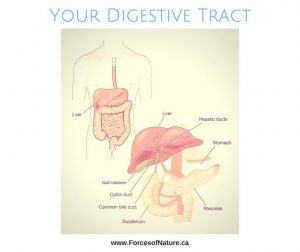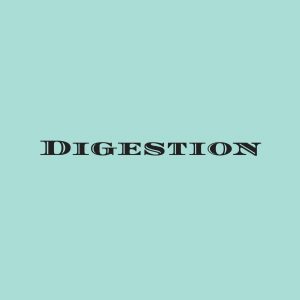
How Digestion Works
What is the digestive system?
Digestive system definition
The digestive system begins at your mouth and ends at the opening of your rectum or anus. It is a lengthy tube and associated digestive organs that are meant to process and absorb food and fluid that you ingest.
Digestion
The digestive system breaks down food into its component parts so that they can be absorbed into your body. There they are used as building blocks for cell growth or repair or fuel for bodily functions.
What are the digestive system organs?
Mouth
Your mouth is the first component of your digestive system. There, your teeth mechanically break down food through chewing or mastication. At the same time, saliva is mixed with the food to help liquify it. Saliva contains an enzyme called amylase which helps to break down starch. So the process of digestion really begins in your mouth. This is why it is best for good digestion, to thoroughly chew your food and eat slowly.
Esophagus
The tube that connects your mouth to your stomach is called your esophagus. It transports liquids and solids to your stomach through a process known as peristalsis. Peristalsis is the rhythmic contraction of the muscles that line your digestive tract. It propels food and waste through your digestive system.
Stomach
Your stomach further liquifies what you have eaten and mixes it with stomach acid. Stomach acid serves several functions:
- Sterilizes what you have eaten
- Ionizes minerals for absorption further down
- Allows you to absorb vitamin B12
- Initiates the process of protein digestion and
- Triggers the release of bile from your gallbladder and pancreatic juice from your pancreas when your stomach empties.
For all of the above reasons, long-term use of acid-suppressing medications (PPIs) is not recommended.
Gallbladder
Your gallbladder is a storage pouch that is attached to your liver. It is meant to store a fluid produced by your liver called bile. Bile is a digestive juice that helps to break down fat. This allows for better fat absorption and absorption of the fat-soluble vitamins A, D, E, and K. Bile also acts to carry waste out of your body through the stool. The gallbladder empties bile into your small intestine where it helps with fat digestion.
Pancreas
Your pancreas is a long, flat gland that lays beside and below your stomach. It serves several purposes, including producing digestive enzymes to break down protein (protease), fat (lipase), and starch (amylase). The other important job of your pancreas is to control blood sugar levels through the production of insulin and glucagon. Your pancreas secretes digestive enzymes into the small intestine through the pancreatic duct.
Small Intestine (Duodenum, Jejunum, Ileum)
Your small intestine is the tube that connects your stomach to your large intestine. It is about 6 meters or 22 feet long. The purpose of your small intestine is to continue the breakdown of your food and to absorb the nutrients out of it. There are tiny finger-like projections on the surface of your small intestine that are called microvilli. These increase the surface area that is available for absorption. Conditions like gluten allergy or Celiac disease can damage these so that absorption is impaired.
Large Intestine (Colon)
Your large intestine or colon is the portion of your digestive tract from your small intestine to your anus. This is where your body absorbs water and minerals. The stool is stored here until you are ready to pass it in the form of a bowel movement.
Why is good digestion important?
Good digestion is important because the nutrients your body receives are dependent on good digestion. Not only is it important to consume high-quality food, but you also have to be able to break it down and absorb it for it to fuel optimal body function.
What are signs of good digestion?
Signs and symptoms of good digestion include:
- Regular bowel movements, at least once per day every day
- Bowel movements that are easy to pass, you don’t have to strain or spend a great deal of time trying to have a bowel movement
- Stool that is well-formed, and about 1-1.5 inches in diameter
- Stool that is free of undigested food, blood or mucous
- Your stool is medium to dark brown, not greyish or very dark
- Gas production is minimal
- Once you have swallowed your food you should be fairly unaware that there is much going on in there until it passes out the other end as a stool. That is, you don’t feel bloated, gassy, nauseous, heartburn, indigestion, burning or pain or have loose stool, diarrhea or constipation.
What are the signs or symptoms of bad digestion?
- Bowels move less frequently than once per day
- Bowel movements are hard or difficult to pass
- The stool is loose, watery, mucousy
- Your stool contains undigested food
- The stool contains blood or mucus
- Your stool is clay-coloured, or very dark
- You feel bloated, gassy, nauseous, experience heartburn, vomiting, indigestion, burning or abdominal pain
- Feeling full after eating very little
- Low appetite
Digestive System Diseases
Diseases of the digestive tract include SIBO, Crohn’s disease, ulcerative colitis, IBS, hemorrhoids, GERD, diverticulitis, gallstones, pancreatitis, fissures, fistula, and colon cancer.
How to improve digestion naturally
Improving digestion naturally involves addressing why your digestive tract is not working normally. Food allergies or sensitivities are often a significant source of digestive system malfunction. Testing and removing these always helps. Otherwise, you can support healthy digestion with digestive aids like digestive enzymes, herbs like dandelion and artichoke to improve bile flow, diluted apple cider vinegar, or betaine hydrochloride to supplement stomach acid, and probiotics to address healthy bacteria in the gut.
Our naturopathic doctor is the expert in restoring healthy digestion and can guide you as to which supplements would be best for you.
Foods that improve digestion
Foods that may help improve digestion include:
- diluted apple cider vinegar
- Kim Chi
- miso
- tempeh
- raw sauerkraut
- kefir, and yogourt
- Boiled cabbage water is rich in an amino acid known as l-glutamine. L-glutamine helps heal and soothe the digestive tract.
- Fibre-rich foods are also beneficial to the digestive system. Healthy bacteria in your gut break down fibre to create fuel for cells that line your digestive tract. Fibre also prevents gut bacteria from digesting the wall of your colon. Fibre deprivation causes the gut bacteria to turn to the mucous layer that protects your colon for food.
How to digest food faster after eating too much at a big meal
With the holidays upon us and the wide array of delectable food choices before us, it’s easy to overeat. Is there a way to relieve the discomfort of overeating and help digest that big meal faster? Prevention is always the best solution, so aim to be more conscious of how much you have eaten, eat more slowly so that your brain has time to register when you are full and of course, stop when you are full. If you have already over-eaten, here are a few tips that may help:
- A tablespoon of apple cider vinegar in a 1/2 cup of water increases your stomach acidity to allow the food to digest and move out of your stomach more quickly.
- Avoid drinking very much for a couple of hours. Fluids dilute your stomach acid and slow digestion down.
- Take a long walk. Gentle movement can help things move along by massaging your intestines and with a little assist from gravity. A relaxing walk can also help turn on your parasympathetic nervous system which helps with digestion.
- Take digestive enzymes. These may irritate if your stomach is inflamed, so it’s best to get advice first. Certain digestive enzymes also contain an extract from pineapple called bromelain. In those who are sensitive to pineapple, they can cause an adverse reaction. So these are definitely NOT recommended for everyone.
Foods that are hard to digest
Foods that require more of your digestive tract’s resources may be hard to digest. Consuming these in smaller quantities may be fine and is preferred rather than restricting them from your diet altogether. Here’s why you may find these foods difficult to digest:
- Protein-rich foods like steak and eggs. These foods require lots of stomach acid to begin the process of protein digestion. If you don’t have enough acid your stomach, they can sit in your stomach for a long time, feeling heavy or some say “like a rock” sitting in their stomach. Our naturopathic doctor helps you to maintain healthy stomach acid levels.
- Fatty foods. Many of our patients report having to rush to the bathroom if they eat anything too greasy. Fatty foods require bile from your liver and gallbladder and lipase from your pancreas to digest. If you are incapable of digesting it well, the body may find it irritating and reject it in the form of diarrhea.
- Nuts and seeds. These foods can be hard for your gut to break down. Seeds, in particular, are meant to pass through your gut intact. You would then poop them out on the ground, assuming you were living in the wild. This is the plant’s way of having you plant the seeds for it.
- Beans and legumes. There is an enzyme called alpha-galactosidase that you need to produce to digest beans and legumes. If you don’t produce enough, consuming these can make you bloated and gassy. You can supplement alpha-galactosidase to make digesting legumes easier.
Digestion involves multiple processes in order to be optimal. Our naturopathic doctor is an expert in fixing digestive system disorders. For more information read these: Irritable Bowel Syndrome (IBS), Gut or Digestion Problems?, Naturopathic Doctors and Naturopathic Medicine
Authored by Dr. Pamela Frank, Naturopathic Doctor, updated March 17, 2025

Digestion References:
- Mahesh S. Desai et al. A Dietary Fiber-Deprived Gut Microbiota Degrades the Colonic Mucus Barrier and Enhances Pathogen Susceptibility. Cell, November 2016 DOI: 10.1016/j.cell.2016.10.043